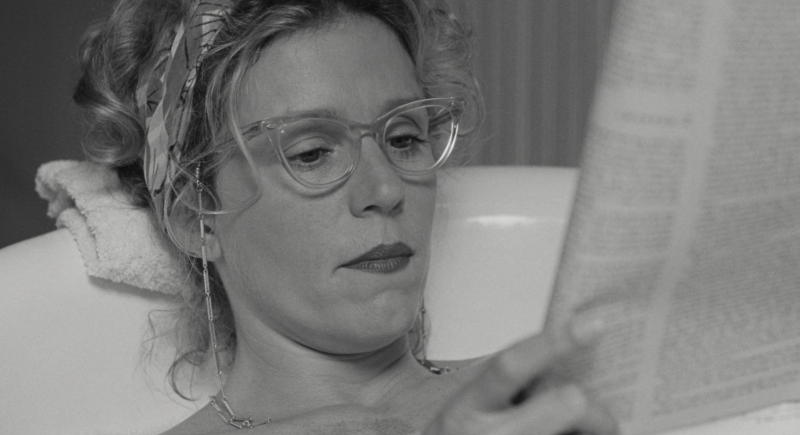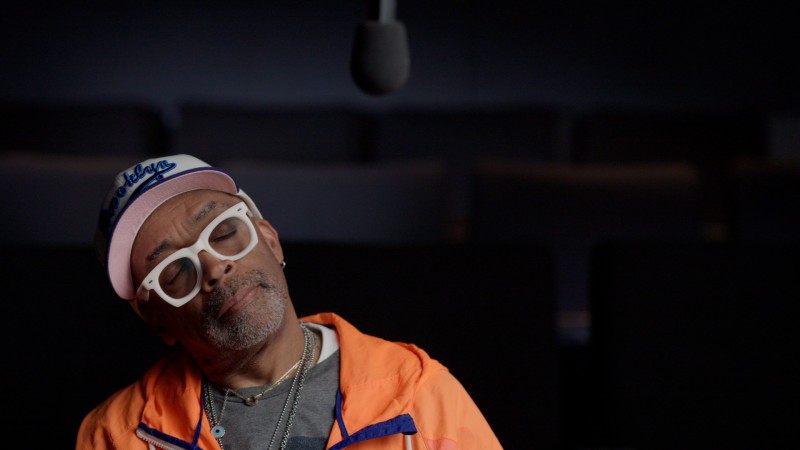Jane Wyman and All That Heaven Allows

Time has added some latter-day ironies to All That Heaven Allows, and not just the revelation that its star Rock Hudson was gay. There’s also the political career of Ronald Reagan, the ex-husband of Hudson’s costar, Jane Wyman—built on the gospel of the American family, something that Douglas Sirk’s exquisite film, which uses one romance to show how hard it was to break free in 1950s America, ruthlessly paints as a fraud. The pair’s eight-year marriage broke up, by Reagan’s own account, in part because his wife was so fiercely ambitious. Watching her play Cary Scott—well-off, well-bred, a housewife who’s always behaved as others expect her to—it’s easy to forget that Wyman wasn’t much like her greatest role.
At the time of filming, Wyman was at the tail end of a career-best run of films, and nearly a quarter of a century removed from any life outside show business. Yet she slips under the skin of this sheltered widow as though she too had always lived in a circumscribed world of immaculate houses, self-involved children, dull parties, and duller companions. Sirk spells out his themes with meticulous clarity, as always. But there is great subtlety in this movie, and it is in Jane Wyman’s performance.
Look at the opening, after a pillar of the local country club, Sarah (Agnes Moorehead), has dropped off a large set of dishes she borrowed. Cary is struggling to get them to her tasteful patio. Up comes her young gardener Ron (Rock Hudson) to lend a hand. Cary’s glances at him keep getting a tiny bit longer as she builds up to asking if he wants to have lunch. She pours him coffee, he sets it down and pulls out her chair. At once, there’s a change in Cary—her already lovely posture gets a touch straighter, and she does a graceful, charm-school slide into the proffered chair. And then, as she offers some rolls, Wyman locks eyes with Hudson, in a way she certainly didn’t do with Moorehead.
Wyman never telegraphs “repressed” with flutters and stammers, as so many do when playing uptight suburbanites. Any good actor knows a drunk scene is about showing the inebriated fighting their symptoms, and Wyman knows that Cary treats her emotions the same way. They’re giveaways, to be concealed as carefully as you’d try to avoid a stagger after one round too many.
In his magisterial The Invisible Bridge, a history of Reagan’s 1976 presidential bid, Rick Perlstein quotes Wyman at the time of Johnny Belinda (1948): “I’m pretty much of a girl who knows her own mind. I’ve taught myself to make decisions. It’s the story of any career woman.” And Wyman was definitely a career woman. Born in 1917 in St. Louis, pushed by a classic stage mother, Wyman arrived in Hollywood in 1932. She spent years cycling through a variety of parts, as though no one at Warner Bros., the studio she signed with in 1936, could figure out what to do with her. Young Jane had a snub-nosed, apple-cheeked prettiness that stopped well short of glamour, and little of the frame-dominating quality that marks an instant star. But she could act. Wyman’s early career shows that in unexpected ways, like with her delicious, Chihuahua-voiced dumb brunette in the wartime farce The Doughgirls (1944). It took more than a decade to get true breakout roles, though: the saintly girlfriend in The Lost Weekend (1945); another supporting part as the memorably harsh mother in The Yearling (1946), which got her an Oscar nomination; and two years later another Oscar nod for the title role of the abused deaf-mute girl in Johnny Belinda. That time, she won.
There were a number of strains on Wyman’s marriage to Reagan—her third of five—including, sadly, a baby who died at birth. Divorce came in 1948, even as her career soared. She made Stage Fright for Alfred Hitchcock, then one sensitive drama after another: The Blue Veil (another Oscar nomination), The Glass Menagerie, So Big. By the time 1954 rolled around, she was big enough to float her own project to Universal producer Ross Hunter: a remake of 1935’s medical melodrama Magnificent Obsession. Directed by Sirk, the film was a monster hit, made a matinee idol out of Wyman’s costar, Rock Hudson, and again garnered Wyman a nomination. That made the Magnificent team a natural for a rematch, and the next year brought All That Heaven Allows.
In 1955, Jane Wyman was thirty-eight. Cary had married at seventeen; at most she’d be just past forty. In the red-lace dress she wears to the country club, her figure is better than that of her daughter, Kay (Gloria Talbott). Not that it does her any good, a fact that stings even as she tries to accept it. After Kay yammers on about the supposed Egyptian custom of walling up a wife in her husband’s tomb, offhandedly concluding with “of course, it doesn’t happen anymore,” Wyman delivers her heavily freighted line (“Doesn’t it? Well, not in Egypt”) without breaking her movements around the room, and with only the tiniest change in tone. Cary returns home later that evening, and hypochondriac bore Harvey (Conrad Nagel) proposes they get married. We’ll be companions, he tells her. It marks the fourth time in less than twenty-four hours that Cary’s been informed—by her friend, both her children, and now her date—that sexually, she’s past it. (Earlier, she was also all but assaulted by a boorish Donald Curtis, which was another kind of insult.) She flinches, tears begin to gather in her eyes, but her surface politeness lets Harvey thinks she’s touched by his affection. We know better.
No wonder she blossoms with Ron, who considers the age difference barely worth mentioning, who offers neither sordid hotel rooms nor boring chats about his liver. Wyman shows the resulting changes in Cary very, very gradually. There’s one seldom-mentioned moment when Cary first accompanies Ron to visit Mick and Alida (Charles Drake and Virginia Grey), his joyfully down-market friends. When Alida cheerfully refuses an offer of help, Cary sinks a little lower in her chair, and her face relaxes into a smile as she sips her cocktail. At last, a place where domesticity can be ignored for a little while.
It makes Cary’s breakup with Ron, and return to her well-appointed cloister, all the more sad and frustrating. She’s given up the man she loves under pressure from her children, and not only are they blithely leaving her, they don’t (until rattlebrained Kay gets a dim idea) understand that it was even a hardship. Cary’s to be left with a TV set, which no one’s even plugged in, to babysit her in the lonely days ahead. Wyman gazes at the screen and in her reflection sees, as Molly Haskell has put it, “her pointless sacrifice projected into the infinity of old age.”
Wyman’s expression echoes an earlier scene at Ron’s cabin, when she lies in his arms and looks off into a far different infinity. “What are you thinking about?” he asks. “That I love you,” she says, almost sadly. Then she sits up and adds the heart of the matter: “It won’t be easy.” Now, just a couple of scenes after that icy Christmas, Cary is ready to go back for her man. That gradually gathering strength, perhaps, is where actress and role truly intersect.




